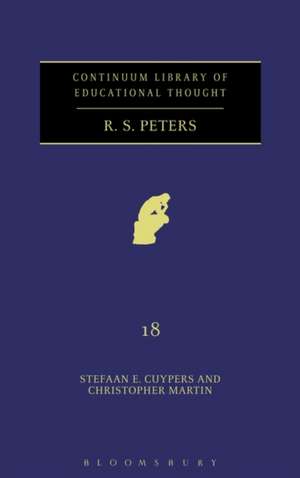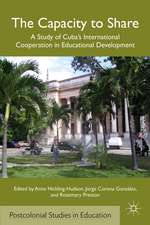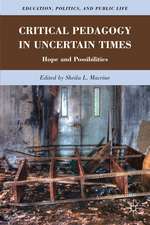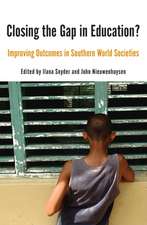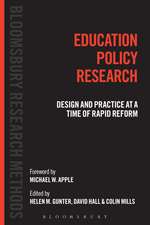R. S. Peters: Continuum Library of Educational Thought
Autor Professor Stefaan E. Cuypers, Christopher Martin Professor Richard Baileyen Limba Engleză Hardback – 28 aug 2013
Din seria Continuum Library of Educational Thought
- 37%
 Preț: 861.75 lei
Preț: 861.75 lei - 37%
 Preț: 770.29 lei
Preț: 770.29 lei - 37%
 Preț: 862.87 lei
Preț: 862.87 lei - 37%
 Preț: 861.83 lei
Preț: 861.83 lei - 37%
 Preț: 862.01 lei
Preț: 862.01 lei - 37%
 Preț: 862.87 lei
Preț: 862.87 lei - 37%
 Preț: 862.21 lei
Preț: 862.21 lei - 37%
 Preț: 860.21 lei
Preț: 860.21 lei - 37%
 Preț: 863.63 lei
Preț: 863.63 lei - 37%
 Preț: 864.11 lei
Preț: 864.11 lei - 44%
 Preț: 864.11 lei
Preț: 864.11 lei - 44%
 Preț: 865.53 lei
Preț: 865.53 lei - 37%
 Preț: 863.17 lei
Preț: 863.17 lei - 37%
 Preț: 861.45 lei
Preț: 861.45 lei - 37%
 Preț: 863.17 lei
Preț: 863.17 lei - 37%
 Preț: 863.17 lei
Preț: 863.17 lei - 37%
 Preț: 861.75 lei
Preț: 861.75 lei - 43%
 Preț: 860.88 lei
Preț: 860.88 lei
Preț: 769.06 lei
Preț vechi: 1367.29 lei
-44% Nou
Puncte Express: 1154
Preț estimativ în valută:
147.18€ • 153.09$ • 121.50£
147.18€ • 153.09$ • 121.50£
Carte disponibilă
Livrare economică 25 martie-08 aprilie
Preluare comenzi: 021 569.72.76
Specificații
ISBN-13: 9781441158048
ISBN-10: 1441158049
Pagini: 264
Dimensiuni: 156 x 234 x 20 mm
Greutate: 0.52 kg
Ediția:New.
Editura: Bloomsbury Publishing
Colecția Bloomsbury Academic
Seria Continuum Library of Educational Thought
Locul publicării:London, United Kingdom
ISBN-10: 1441158049
Pagini: 264
Dimensiuni: 156 x 234 x 20 mm
Greutate: 0.52 kg
Ediția:New.
Editura: Bloomsbury Publishing
Colecția Bloomsbury Academic
Seria Continuum Library of Educational Thought
Locul publicării:London, United Kingdom
Caracteristici
A coherent and user-friendly account of R. S. Peters' work saving readers valuable research time.
Notă biografică
Stefaan E. Cuypers is Professor of Philosophy in the Institute of Philosophy at the University of Leuven, Belgium.Christopher Martin is Assistant Professor in the Faculty of Education at the University of British Columbia, Okanagan Campus, Canada.
Cuprins
Series Editor's PrefaceForeword, John White (Institute of Education, University of London, UK)AknowledgmentsPart I: Intellectual Biography 1. Peters' Analytic Paradigm in the Philosophy of EducationPart II: Critical Exposition of R.S. Peters' Educational Thought2. The Concept of Education, Aims, and Educational Processes 3. Initiation and the Educated Person4. The Ethical Justification of Education5. Liberal Education, the Quality of Life, and Teacher Training6. Comprehensive Moral Education and Personal Autonomy7. Educating the Emotions and the Life of ReasonPart III: Reception and Relevance of R.S. Peters' Work8. The Impact and Importance of Peters' Analytic ParadigmNotesBibliographyIndex
Recenzii
The late Richard Stanley Peters was the British architect of post-war philosophy of education as a worthwhile branch of modern analytical philosophy and a philosopher of global significance and reputation. Hard on the heels of his recent passing, this clear, accomplished and overdue appreciation and celebration of Peters work - by two distinguished contemporary educational philosophers of Peters' own analytical temper and rigour - could hardly be more timely, and one may be certain that it would have been received with much pride and gratitude by the subject of this study himself. Like Peters' own output, this work is a shining example of philosophical insight and clarity at its best, and - for this as well as its subject matter - should be compulsory reading for all who might aspire to contribute further serious work to the field of philosophy of education.
An essential and long overdue critical guide to the work of the most significant educational philosopher of the 20th century. Informative, comprehensive, well organised and clearly written, it brings out the breadth, scope, and practical relevance of Peters' work. Particularly to be noted is the authors' awareness of Peters' recognition of the social context of educational discourse.
R. S. Peters was a towering figure in 20th century philosophy of education, providing not only important substantive views but a methodology and an agenda that still influences work in the field. Cuypers and Martin have produced the first book-length study of Peters' work and its impact. This important, insightful and judicious account will be required reading for all who pursue the philosophical project Peters put in motion.
Cuypers and Martin reveal the richness of Peters' thinking about education, including his concern for the human condition and the predicaments of life, and his emphasis on the moral value of the work done by those engaged in the educational enterprise. Erudite, yet written with ease and clarity, their book shows both the overarching trajectories and nuanced details of Peters' thought. This book is a great companion for readers already familiar with Peters' work, as well as for those looking for an entry point into the complexity of his central ideas. The authors demonstrate the relevance of philosophy of education as a unique discipline that can significantly contribute to contemporary discussions on educational policy and practice.
An essential and long overdue critical guide to the work of the most significant educational philosopher of the 20th century. Informative, comprehensive, well organised and clearly written, it brings out the breadth, scope, and practical relevance of Peters' work. Particularly to be noted is the authors' awareness of Peters' recognition of the social context of educational discourse.
R. S. Peters was a towering figure in 20th century philosophy of education, providing not only important substantive views but a methodology and an agenda that still influences work in the field. Cuypers and Martin have produced the first book-length study of Peters' work and its impact. This important, insightful and judicious account will be required reading for all who pursue the philosophical project Peters put in motion.
Cuypers and Martin reveal the richness of Peters' thinking about education, including his concern for the human condition and the predicaments of life, and his emphasis on the moral value of the work done by those engaged in the educational enterprise. Erudite, yet written with ease and clarity, their book shows both the overarching trajectories and nuanced details of Peters' thought. This book is a great companion for readers already familiar with Peters' work, as well as for those looking for an entry point into the complexity of his central ideas. The authors demonstrate the relevance of philosophy of education as a unique discipline that can significantly contribute to contemporary discussions on educational policy and practice.
